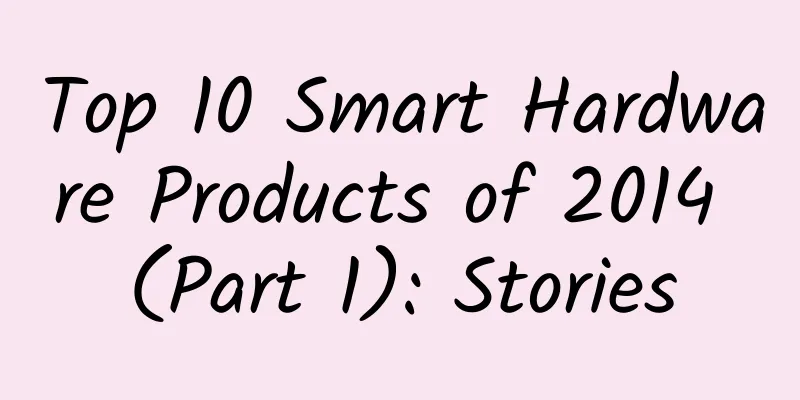Top 10 Smart Hardware Products of 2014 (Part 1): Stories

|
First of all, I want to emphasize that this is a very personal year-end review. If I really treat this as a performance report and publish it publicly, my boss, Principal Lin, will probably confiscate my annual meeting prize. But on the other hand, if I wasn't at the forefront of this industry and had a responsibility to devote myself to it, God knows that a student of media management like me would one day end up doing hardware development. The information in this article is based on my personal knowledge and experience. No verification or index is provided. So, it is both real and imaginary, both true and false, and the readers can take what they need. ====================================================== The beginning of the story is very simple, but not necessarily friendly. People in the industry must have heard of two names, one is KnewOne and the other is Roll Call Time. I wonder how people in the technology industry who have never worked for these two companies would feel if they heard these two names at the end of 2014. Anyway, I felt like it was a lifetime ago. From the end of 2013 to before the Spring Festival of 2014, Leifeng.com's reporting direction had completely shifted to smart hardware, and the Maker Marathon had also started and became somewhat famous. From the perspective of a chairman with 16 years of experience in technology media and a COO with 7 years of experience in technology media, the rise of a new technology field always follows the path of technology → entrepreneurs → large company platforms → ecosystems → consumers, including portal communities, social networking, search, Internet advertising, and online games. Since a new media company has entered this new entrepreneurial field more than half a year in advance, it should follow the routine. At this time, we saw two companies, KnewOne and Dianmingshijian. We admired them very much, but also felt panic and crisis. From the perspective of a media person educated in the editorial department system of traditional technology media, it was impossible to imagine that they could directly reach consumers and directly reach terminals and consumer scenarios when the technology, platform, and ecology were still imperfect. The most extreme idea is: Are we being eliminated because of our backward ideas? -- Well, the tycoons in traditional enterprises who spend hundreds of thousands of dollars to attend Internet thinking courses also think so. But on the other hand, a group of entrepreneurs are like Django who has been freed. In early 2014, the most common voices we heard were "disruption" and "redefinition". And I feel that this is not a bubble. The dozens or hundreds of bracelets and watches and Samsung gear advertisements at CES at the end of 2013 were clearly in front of us. But I really don't understand it, what should I do? Just go ahead and do it. 1. Quirty
At the beginning of the year, Quirty was a word that was almost as popular as Kickstarter. At a time when Kickstarter's most orthodox Chinese disciple (at least at that time) was at its peak, we planned to use the power of new media to create a Quirty - although I still haven't really experienced what Quirty's service is like. The result is predictably bleak. Not many people have interesting ideas to come up with, and not many people are interested in watching and improving others' ideas. Forget Quirty, I didn’t even touch the door of Fancy - interestingly, the Fancy mode became popular at the end of 2014. In order to research the product, I installed 9 domestic Fancy-like applications on my phone. The only consolation was that I later discovered that I was not the only one who failed with Quirty. Not only were there several startup teams that had faded out of the industry, but even the currently popular Company X and Company X were also troubled by the Quirty model. The Quirty model left us with a shell of the Knewbi community, now called Zhiqu.com. 2. Maker
Although Leiphone.com’s Maker Marathon is not the first public maker event in the industry, it is one of the most influential of the first batch. But it was not until the Maker Faire in Shenzhen in April 2014 that we realized that the maker movement and the maker commercialization we envisioned were completely different things. No financier would deny that investing in the maker movement is to incubate long-term commercial projects - yes, I think so too. But obviously returns and expectations are not the same thing. There are two roles worth mentioning in 2014. One is called Seeed Studio. Simply put, it is a company that sells development boards (Pan Hao will probably hit me for saying this). The official statement is "providing rapid development tools for small innovators to help hardware product prototypes go into production and market promotion." Another character is the famous former Foxconn CEO Cheng Tianzong. The passion and twists in the middle would be enough to write a book if they were expanded. It is enough to just tell the beginning and end of these two characters in 2014. The Shenzhen Maker Faire in March was the beginning. This event was unprecedentedly successful compared to the Maker Faire in 2013. The momentum of “makers” has been rising in public opinion for more than half a year. Objectively speaking, I personally think that it was JD Crowdfunding that poured cold water on this momentum. The process is just like Wang Feng’s failure to make the headlines. Back then, Seeed Studio showed a confident and rapid expansion in the first half of the year. And Mr. Cheng Tianzong has frequently appeared in the smart hardware circle. From the information I have personally come across, Seeed Studio aims to get more ordinary people into the circle and start developing hardware, while Mr. Cheng is optimistic about the ecological construction of maker products and commercialization, and constantly stands up for it. Personally, I feel that they really want to lead a universal technology movement and change the world, and this hope seems to be coming true in the first half of 2014. By the end of 2014, we saw that the commercialization of the maker movement had fully shifted to the field of education. Most of the information from Seeed Studio in my circle of friends was about children's education, and our own business unit "Hard Innovation Nation", which was expanded based on the maker marathon, also focused on robot and smart hardware development education. As for Mr. Cheng, I haven't communicated with him in the second half of the year, but apart from the news that he visited hardware companies one by one, he invested in an O2O project. Standing at the end of 2014, I can only say that it is too early to talk about ecology. It is also worth mentioning that in the matter of makers, we found it helpless that as a new media, there is really little we can do for makers except for holding conferences. But to hold conferences, there must be clear suppliers and demanders, otherwise it will just be a pep talk and mobilization meeting. Supply and demand docking is feasible on the other side of the ocean, but here there are too few suppliers. As for Zhiqu.com, at that time it had created a shopping mall where customers could get discounts by clicking “likes”, and was painfully undergoing its second round of redevelopment. 3. Crowdfunding
Regarding crowdfunding, I have already written two articles titled "Crowdfunding is dead", and I am waiting for the third article. I would like to add that, in fact, when Zhiqu.com launched its crowdfunding channel in June, I have been trying to avoid competition with Dianmingshijian, and have cooperated with Zhongchou.com and Taobao Crowdfunding. I have also expressed the view at many events that the plate of creative hardware and crowdfunding is not big enough and the whole industry needs to work together. But there seems to be a sense of unwarranted tension. This is really unnecessary. We are all small entrepreneurs who have not found a reliable development path. But it doesn't matter. This kind of small wave will be forgotten when the real tide comes, and maybe all the players in the game will be forgotten. For example, do you remember Kaixin.com? In short, Zhiqu.com launched a pre-sale (crowdfunding) channel in June, and merged pre-sales with spot sales in October, and no longer displayed the fundraising sales amount. The whole experience can be summed up in one sentence: it brings no benefits to entrepreneurs, nor to the platform itself. The only consolation is that we have promoted the launch and expansion of a very reliable domestic smart watch, Weloop Xiaohei. The crowdfunding amount of 600,000 in one month plus 200,000 overseas orders made us full of confidence. But now it seems that you have the nerve to tell others about the crowdfunding amount of 800,000? - It's less than half a year. 4. Traditional Small and Medium Enterprises
Speaking of Weloop, to be honest, I personally think that Zhiqu.com has picked up a bargain. Because Weloop represents a unique role in hardware entrepreneurship, traditional consumer and enterprise electronic companies have withdrawn to make smart hardware, and their product control and production technology are far superior to those of Internet people and grassroots entrepreneurs. More importantly, they are not only not short of money, but also know exactly how to spend money. These are mature players. If there is no help from Zhiqu.com, they will sooner or later become one of the mainstream forces in the industry. The advantages of organizational management (well, this thing has been criticized by the post-90s generation as worthless, but sorry, this discipline still manages the vast majority of post-90s employees in China.) allow such companies to quickly become one of the leading companies in smart hardware. Similar to Weloop is LeXin Health, one of China's largest manufacturers of blood pressure monitors and health scales, and also a strategic partner of Zhiqu.com. My feeling is that compared with entrepreneurs pursuing wild growth and giant platform companies, these companies have a clearer demand for new media, and the businesses and resources that new media excel in can just be used by them. But there is another possibility: because we are also very traditional, we can get along well with these traditional craftsmen. But in 2014, there was a group of exceptions among this kind of power: Xiaomi Ecosystem. So far, it is said that there are 25 Xiaomi Ecosystem companies. Lei Jun said that "open win-win, be a good shareholder", but objectively this choice does have gains and losses, and the taste is like drinking water. Their common characteristics are that they are almost all from supply chain companies, have unique experience and strong resources in production management, focus on execution but are weak in the market, and suffer from the dual problems of information asymmetry and technological iteration. At the end of 2014, we saw that Xiaomi's ecological chain companies that had already released products were working ten times harder on social marketing than Xiaomi did back then. But objectively speaking, the results were probably only one-tenth of what Xiaomi achieved back then. Enhancing the competitiveness of Xiaomi mobile phones is certainly a credit, but these companies, like other entrepreneurs, hope to quickly gain market experience and resources, which is the key to their own success. However, the timing and potential are different, and some things are really not enough just by hard work. But everyone knows that they will survive, and they are still working hard. In fact, whether it is traditional supply chain companies or traditional consumer electronics vertical brand companies entering the smart hardware industry, they are the most noteworthy forces in 2014. But there is still a personal evaluation, I always feel that this group of people is also the group that is most deeply entangled by "feelings". Feelings are a matter of closed doors. It's fine if consumers believe them, but if you believe them yourself, you will really lead yourself into a ditch. As for the future, I would rather believe that the future BTA is in this power, but how to do it? Xiaomi has no answer yet, so how can I know? 5. Sales | Jianghu
Traditional SMEs entering the smart hardware industry can be said to be a new breed of craftsmen. But another force shined in 2014. They were the gold medal salesmen. They were like fish in water, coming from another fish pond to this one. The two outstanding ones are Li Xiaoliang and Dai Saiying. Li Xiaoliang's Cuptime is probably well known in the industry. It was the hottest smart hardware in 2013. And he did a great job in 2014 as well. From my personal observation, Maikai is probably the least miserable of all the grassroots hardware startups I have come across. The welfare benefits are way better than anything else, and I guess the profits on the books must be very good. The launch of the new product Here at the end of the year also shows its market wisdom. Not to mention that the launch marketing activities of this product are well executed in the industry, it is also admirable to think about this product. What is Here? It is actually a set of standards, which are being developed in WeChat and QQ open platforms (the love-hate relationship between SNG and WeChat business group). In simple terms, it is to transmit the data of various smart hardware to the cloud of Maikai (Tencent) through online devices, and the cloud exchanges data with the hardware product's own server. This technology has been available since 2013. The functions implemented by this standard are: QQ, WeChat, or Maikai Here can integrate, compare and display data across different smart hardware, skipping the APP or even the mobile phone. The result is that all smart hardware users are from Tencent or MaiKai, and the hardware connected to the platform can just be used as CP. This is a good and bad thing. For hardware teams that have no platform ambitions, it is a timely help, providing users, solutions and traffic; for hardware teams that have platform ambitions, haha. So the question is, will Maikai compete with WeChat and Tencent Open Platform? The standard answer is, it doesn’t matter. This is a very clever move. Maikai's position in the industry was already good, and this product directly raised Maikai to a higher level. On the other hand, after seeing the product introduction, I made a blind guess. If I were Li Xiaoliang, I would use the supply chain resources and process flow of the scales to produce Here, without any pressure. Moreover, I would never believe that Li Xiaoliang intended to use Here to make a profit. ——The wisdom of a gold medal salesman who has been in the home improvement and building materials business for more than ten years. Dai Saiying needs no introduction, he is the founder of the brand "Three Dads", the first crowdfunding project in China to exceed 10 million yuan. However, compared with the brand of Tingmei underwear that he once managed, this business is really nothing. The market resources he can mobilize and the potential energy he can create are naturally far superior to ordinary entrepreneurs. There is nothing wrong with this. As a new media operator, I dream of cooperating with such entrepreneurs - in fact, I am promoting it. I believe that other competitive teams with commercial intentions are the same. Having dealt with Li Xiaoliang and Dai Saiying respectively, they have clear business logic and a lingering underworld atmosphere, which is precisely the sharp weapon to break the old system of technology entrepreneurship in the technology circle. We will see more and more stories of gold medal salespeople adept at handling matters in the field of smart hardware. This is a normal phenomenon that was not originally expected. The smart hardware industry directly cuts into consumers from the very beginning and then forces the upstream. No matter how you look at it, it is more like fast-moving consumer goods or the retail industry. It is not a victory of technology. What did Zhiqu.com do in front of these people? Apart from the second panic, it did nothing practical. In the matter of smart hardware marketing, we only have a junior coaching certificate, while they are national top athletes, who have played in championships even if they have not played in the Olympics. ====================================================== Having said that, if we have the ability to participate in the Olympics, why would we want to be a middle school physical education teacher? We should just focus on hardware. As a result... we actually started working on hardware in October... Link to this article: http://www.leiphone.com/news/201412/j8xSB131QeeQycAn.html |
<<: iOS is getting worse and worse. What’s wrong with it?
>>: Xiaomi Mi 5 will be released in January, why was it released ahead of schedule?
Recommend
Marvel movie "Avengers" 4 ultra-clear 60-frame collection
Download Marvel Universe Movie Collection Marvel ...
What are some ways to increase followers on Tik Tok? How to increase the number of Douyin followers to 1,000?
This article mainly introduces the methods of inc...
How to play in Douyin store group? A complete guide to Doudian operation
With the popularity of Douyin live streaming and ...
"Tao Yuanming" Carnival - In-depth look at the key indicators of the brand sponsors of "Produce 101"
"Produce 101" has become popular, and i...
The green fried toothpicks are "fragrant", and the Food Safety Bureau issued a reminder: Please don't eat the toothpicks!
Image source: Internet About a month ago, someone...
[Daiyu Finance] Pantaoyuan Swallow Returns Strategy Swallow Style Strategy Third Style Returning Slowly on the Road
[Daiyu Finance] Pantaoyuan Swallow Returning Stra...
Gas Safety | How to Choose Gas Monitoring Products Correctly?
People often use three types of fuel gas in their...
Get 10,000+ users in 7 days, with a conversion rate of over 50%. You only need to do 3 things to achieve group fission
% ignore_pre_1 % When talking about traffic now, t...
February 2019 Marketing Calendar is here!
The so-called pendulum theory, It is said that ma...
Three steps to make your Internet event marketing popular!
Today, let’s talk about a marketing topic that ma...
Power generation depends on waves! Have you ever seen wave power generation?
Wave energy is a type of ocean energy that appear...
More than just delivering happiness: How does a smile shape our emotions?
Smiling, this seemingly simple facial action, pla...
How do smart home appliances eliminate the "gap" between products and users?
To this day, there is still no clear definition o...
What to do if your phone gets "hot" in summer? Here's how to cool it down quickly!
The weather is getting hotter and hotter. Have yo...
Cocos v2.2.1 launches 3D scene editor to challenge the 3D engine market landscape
On March 30, the highly anticipated cocos v2.2.1 ...









